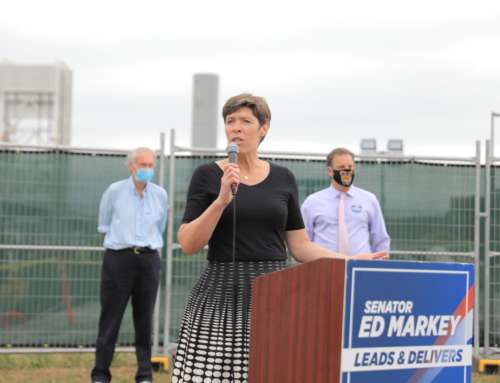(BOSTON) – At a hearing held today by the Joint Committee on Telecommunications, Utilities and Energy, Representative Joan Meschino (D-Hull) joined colleagues and advocates to support her legislation promoting the electrification of fleets and vehicles.
Efforts to advance a transition to electric vehicles in statute are part of a broader trend that recognizes the pressing need to decarbonize the transportation sector, both within and beyond the United States. Massachusetts and California have already indicated commitments to have all new cars sold in each state be electric by 2035. The United Kingdom and Norway have made similar commitments, making plans for car sales to be zero-emission by 2035 and 2025, respectively. Automakers have also recognized the significance and urgency inherent in the transition, with Volvo planning to go fully electric by 2030, Honda setting a goal of all electric vehicles by 2040, and General Motors aspiring to zero emissions in its light-duty vehicles by 2035.
Bills filed by Representative Meschino in Massachusetts further pursue the electric transition. Jointly filed with Representative Christine Barber (D-Somerville) and Senator Joseph Boncore (D-Winthrop), An Act to promote electric vehicle fleets by 2035/An Act to promote zero-emission vehicle fleets by 2035 (H.3255/S.2139) require that all publicly owned and leased vehicle fleets be electric by 2035. Critically, the legislation also prioritizes fleet deployment at locations serving environmental justice populations. The bill establishes goals and incentivizes the transition of fleets, including those used for ridesharing and ride-hailing, to electric vehicles.
Representative Meschino also filed An Act promoting zero-emission vehicles (H.3347/S.2151), co-presented with Senator Brendan Crighton (D-Lynn) and co-sponsored by Representative Steven Owens (D-Watertown), which facilitates the transition of the private passenger fleet. The legislation extends the MOR-EV program and enacts provisions that will better support low-and-moderate income residents. The bill also calls for additional and accessible charging stations, supports local programs in their efforts to install charging stations in residences, and establishes criteria for parking facilities to be wired to support charging.
“These bills offer robust pathways to reduce emissions in the transportation sector and promote green jobs,” said Representative Meschino. “To meet our state commitments to achieve a net-zero future by 2050 and a 50% reduction in carbon emissions by 2030, the electric vehicle transition must function in service of our climate goals while continuing to advance equity and environmental justice.”
“By electrifying vehicle fleets, H.3255 creates permanent change to positively improve the health of our communities for decades to come,” said Representative Barber. “Over 40% of greenhouse gas emissions in Massachusetts are from transit. Residents of color are exposed to 26-36 percent more pollution from vehicle emissions compared to the exposure of white residents. H.3255 prioritizes the deployment of electric vehicles in environmental justice neighborhoods. Electrifying fleets addresses air pollution and provides a solution to improve health, rooted in equity, for cleaner energy and transportation that will benefit all residents of the Commonwealth.”
“Not only is a transition to electric vehicles necessary to meet our climate goals, but it is also an important component of public health,” said Representative Steve Owens. “The past 16 months have taught us that bad air that led to increased rates of asthma in vulnerable communities resulted in worse COVID outcomes. Reducing the emissions caused by our transportation sector is good for the climate, our lungs and – with gas prices rising – our pocketbooks.”
Though they were not heard today, two more bills before the Joint Committee on Transportation also reflect these legislators’ commitment to furthering the electrification of the transportation sector. Representative Meschino’s An Act relative to an electric transportation future (H.3541) mandates that all light duty vehicles registered in Massachusetts starting in 2035 be electric. Representative Owens, Representative Barber, and Senator Crighton also filed An Act relative to public transit electrification (H.3559/S.2292), which sets interim targets and requires the MBTA to operate a fully electric bus fleet by 2030 and a fully electric commuter rail system by 2035. The bill also requires regional transit authorities to operate fully electric bus fleets by 2035 and mandates air monitoring stations around bus maintenance facilities to protect the health of nearby residents and workers. These bills have yet to be assigned a hearing.
H.3255/S.2139 and H.3347/S.2151 are pending before the Joint Committee on Telecommunications, Utilities, and Energy, and now await action by the committee.

